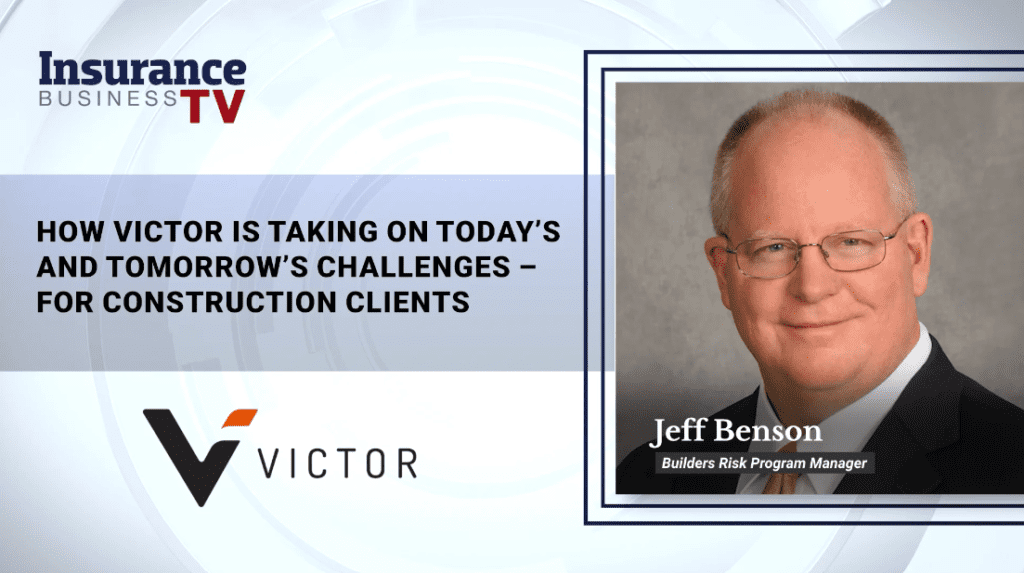What should brokers and agents be mindful of in the builders’ risk space?

Paul Lucas 00:00:06
Hello everyone and welcome to a special edition of Insurance Business TV as we delve into the construction insurance market, ever since COVID, of course, the market is faced a litany of issues from the supply chain to labor shortages to workplace restrictions. But how is the market looking now? And what are the current trends to be aware of in this edition we’re welcoming Jeff Benson, Builders Risk and Contractors Equipment Program Manager at Victor Insurance Managers to find out. Jeff, welcome to Insurance Business TV.
Jeff Benson 00:00:37
Thank you for having me, I really look forward to discussing current topics that affect builders risk and contractors equipment.
Paul Lucas 00:00:44
Well, let’s delve into those then Jeff, what industry trends do brokers and agents need to be mindful of, in your opinion in the year ahead, and indeed beyond?
Jeff Benson 00:00:54
Yeah. So this has been going on for several years now. But I would say the major, major things impacting the construction marketplace are the length of time it’s taking to complete projects, and the additional cost due to inflation supply chain disruptions. So those are those are the major events that are affecting construction insurance. The other thing I would say too, is catastrophic weather events. And, you know, we just waited to becoming more prevalent, and we have to understand how that impacts our business. And I would say, you know, I wouldn’t really write these events, so everybody knows about them. But it would be the tropical wind storm, the southeast, the convective wind in the Midwest, the wildfires in the West, the flooding in various parts of the country, I could go on and on and on. But these things are becoming more prevalent. And also what’s happening is more and more people are moving to what I call the impacted areas from these things. That’s just a population trend, though, that’s impacting construction insurance.
Paul Lucas 00:01:54
So there’s a big events, Jeff, but tell us more about the current loss trends in the construction market.
Jeff Benson 00:02:01
Yeah, so from my perspective, we deal with, you know, courses of construction buildings being built. And what we are seeing is the frequency problem that we have, probably this is just a little bit anecdotal, but it comes from the lack of skilled labor. So we have a little lost control issues on the job site, just a lot of claims are happening to me, and they could be prevented with some basic loss controls. So maybe cleaning up the job site or having people, you know, security measures on the job site, these kinds of things would reduce frequency, and we’re seeing some frequency issues along those lines, water damage, you know, small leak goes, it goes unnoticed for a weekend leads to a big claim. So that’s basic loss control. I see that and then in builders risk, you always have the frequent the severity problem, we have a catastrophic event, or a fire that burns the building down. So those are the trends I think that are that we’re seeing.
Paul Lucas 00:02:57
Okay, so you you painted a picture for us. But tell us a little bit about how your business how Victor is adapting to these trends, whether that the trends existing now, or perhaps the ones that you foresee in the future?
Jeff Benson 00:03:09
Yeah, so I think Victor, what you try to do is, first of all, I’m a big believer in communication with with the agent. So I always stress when the agent calls me and says this analysis, we need to talk, you need to talk to your underwriter, you need to stay in close contact with them. You know, it seems like everybody would do that. But it’s funny agents are like, Well, I’m not used to talking to the underwriter who said, Well, that’s what you need to do. We’re in this world where everything’s automated, fast paced. But on some of these larger accounts, simply picking up the phone and calling the underwriter is worth a lot. So I always stress that communication piece. Once the underwriter understands the risks we can place, you know, we can make sure the right terms are in place. It’s just one of those things. It’s maybe the way it’s always been, but I think we need to talk about it more today.
Paul Lucas 00:03:56
Yeah, well, speaking of talking with with brokers and agents, just give us a little insight into why they should be choosing to work with Victor.
Jeff Benson 00:04:03
Yeah, so I’ll say that I think we make ourselves readily available to the agent. So I’m a big believer in that if you have a question, you will get an answer. The if we can do it through automation, live chat and things like that, that’s great. But if you have to pick up a phone call myself or my team, you we get accolades. A lot of times like we actually got through to human quickly. And and builder’s risk more than other lines of business. Timing is everything. So there might be a 10 o’clock in the morning, I get a call, the agent will say to closings at two, I forgot to place the business, can you help me? So it’s literally a matter of a few hours where we have to gather the data, provide you an adequate quote, for the closing. So we operate in a very fast paced world for builders risk, and we recognize that we strive to be available all the time.
Paul Lucas 00:04:55
Yeah, I think having a human on the end of the line is definitely a standout property. Question in today’s market, but do you have any other tips or key messages perhaps for the brokers and agents watching as they’re looking to navigate this construction insurance market landscape?
Jeff Benson 00:05:11
You know, this is something that happens every single day. So you know, the standard in our businesses to write a 12 month policy. So regardless of the size of the project, they write a 12 month policy, you have to the agent has to explain to the contractor that this is probably gonna go over 12 months. So at the end of 12 months, you’re gonna have to either extend the policy or renew the policy. So it’s much better to get that up front, have that agreement with your underwriter, make sure the contractor understands. So back to that communication piece. You know, 10 months after we write a policy, we send an email out and say, if you still need coverage, we’re here for you. When I can’t stress that enough, because we get calls in the last second, sometimes they forget, now a month has gone by with no coverage. We do not like to see gaps in coverage. So number one is just assuming we know these things are going to take longer. And we also know they’re going to cost more because of inflation. So build that in upfront, have that conversation with your contractors, and have that worked out with your underwriters. It’s critical.
Paul Lucas 00:06:11
Yeah, great tips, Jeff, and huge thanks for your time today.
Jeff Benson 00:06:15
Thank you very much. Anytime you want to talk about builders or as we’re contractors, equipment, I’m here for you.
Paul Lucas 00:06:21
And if you want to keep building your insurance knowledge, that was my obligatory construction plan, well keep it right here and Insurance Business TV




